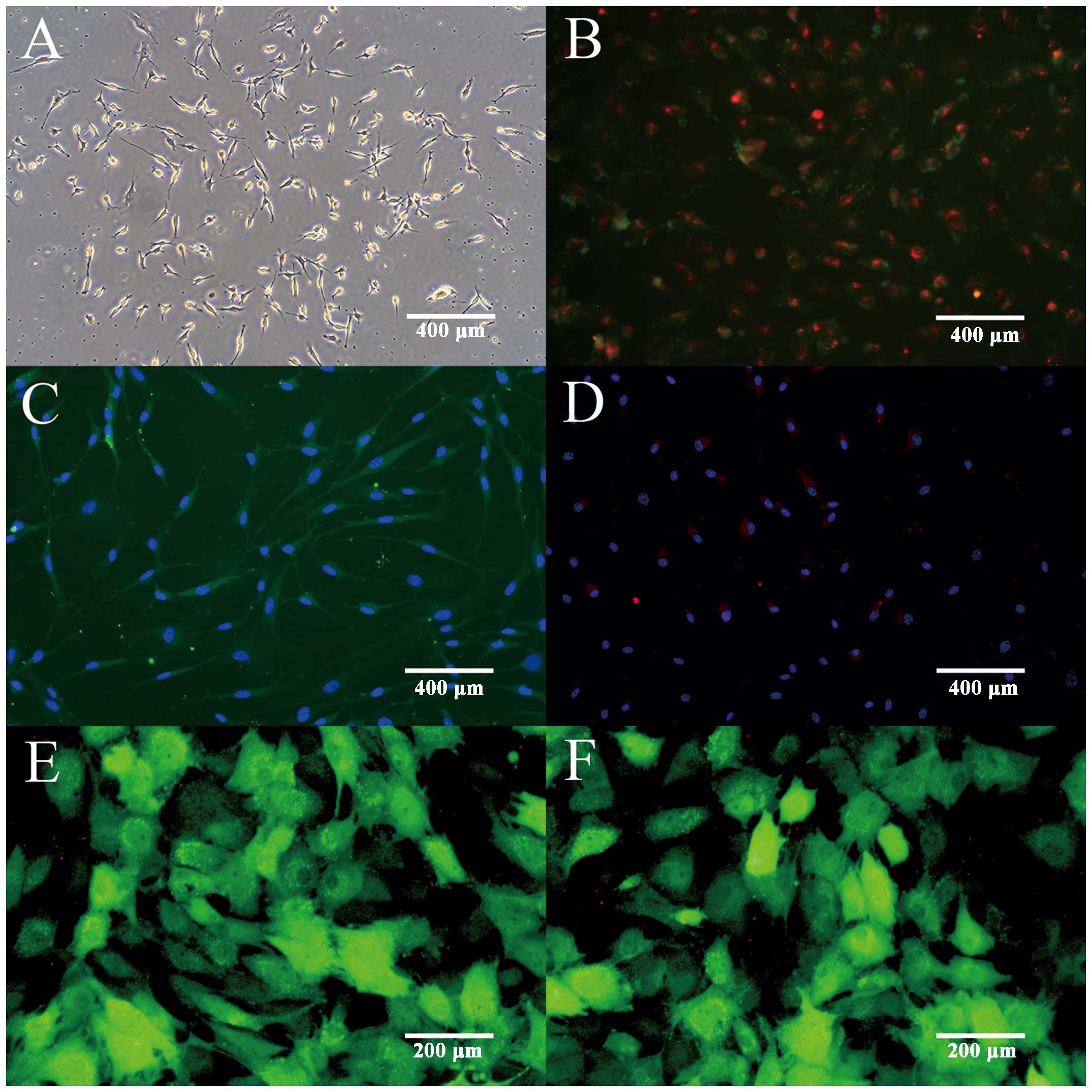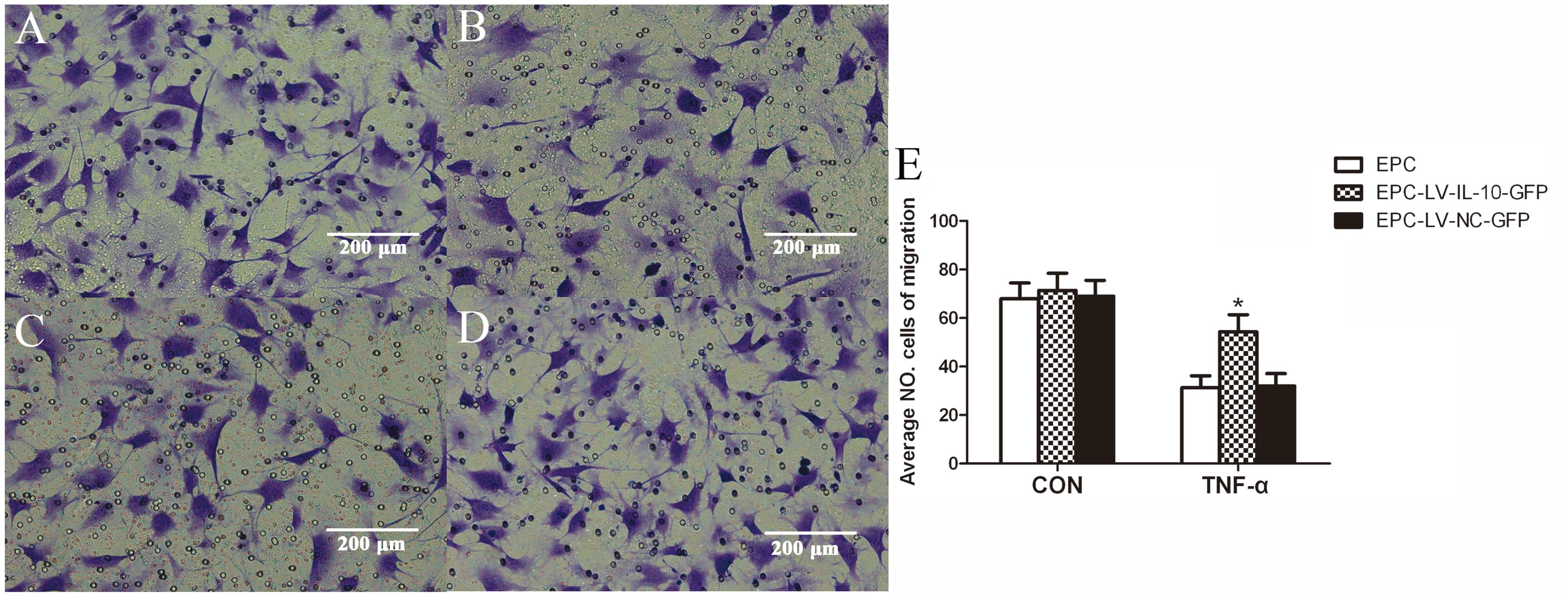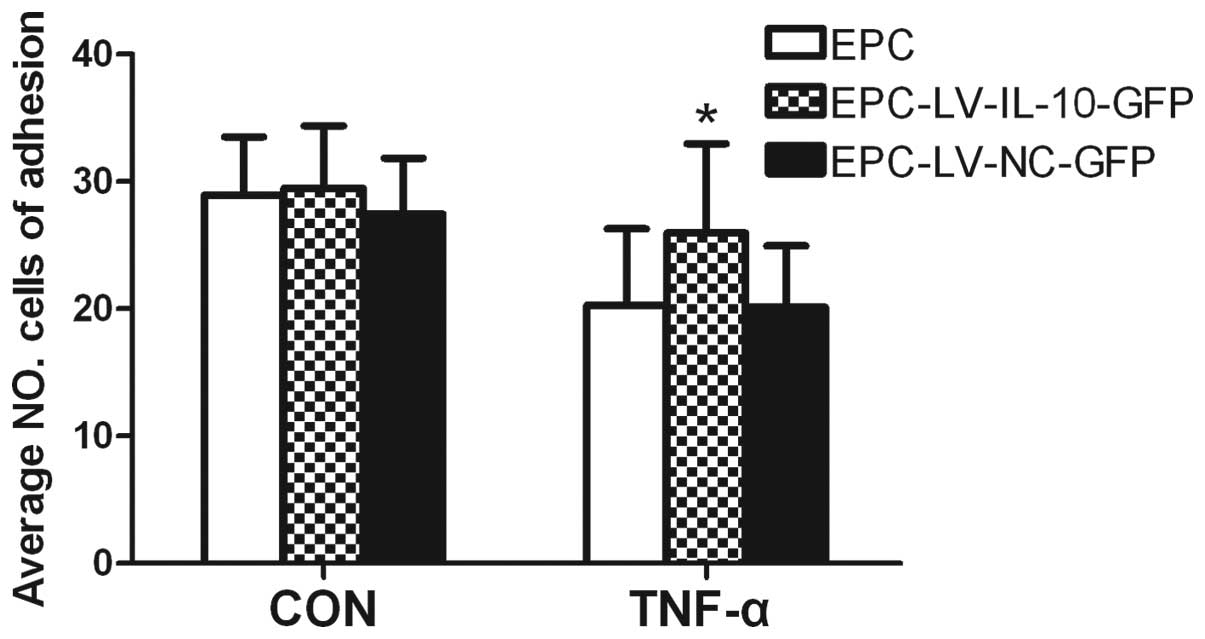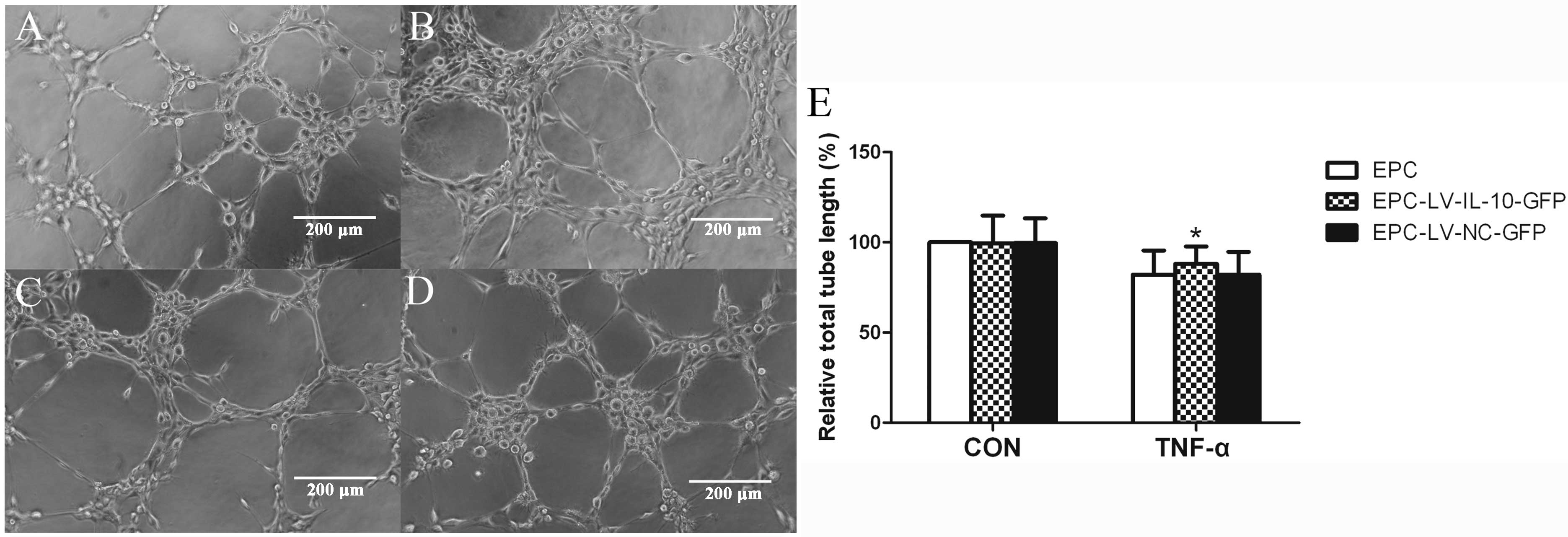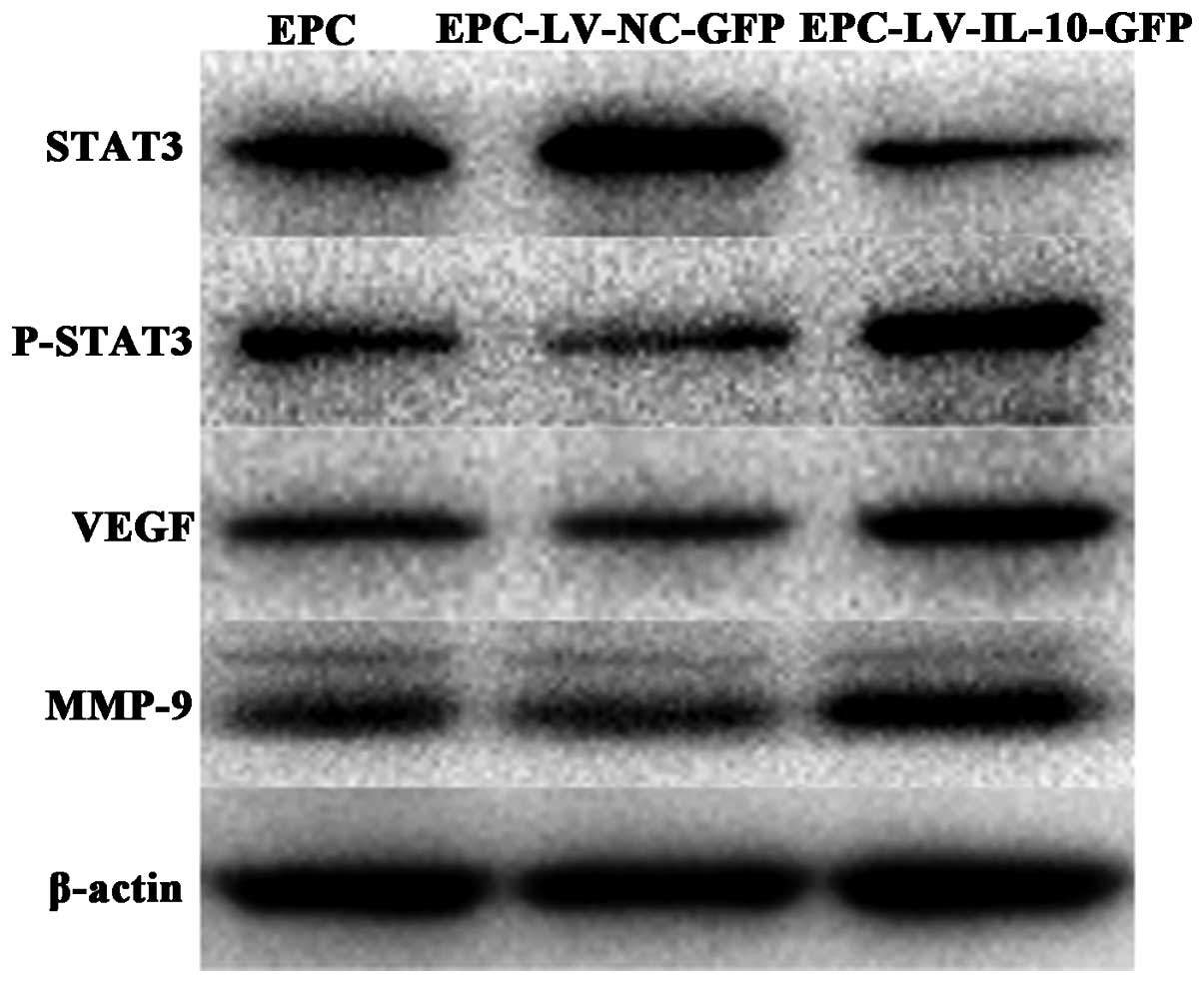|
1
|
Huang H, Huang F and Huang JP:
Transplantation of bone marrow-derived endothelial progenitor cells
overexpressing Delta-like-4 enhances functional neovascularization
in ischemic myocardium. Mol Med Rep. 8:1556–1562. 2013.PubMed/NCBI
|
|
2
|
Barsotti MC, Santoni T, Picoi ME, et al:
Endothelial progenitor cell homing in human myocardium in patients
with coronary artery disease. Int J Cardiol. 15:516–517. 2014.
View Article : Google Scholar
|
|
3
|
Long J and Wang S, Zhang Y, Liu X, Zhang H
and Wang S: The therapeutic effect of vascular endothelial growth
factor gene - or heme oxygenase-1 gene-modified
endothelialprogenitor cells on neovascularization of rat hindlimb
ischemia model. J Vasc Surg. 58:756–765. 2013. View Article : Google Scholar
|
|
4
|
Roncalli JG, Tongers J, Renault MA and
Losordo DW: Endothelial progenitor cells in regenerative medicine
and cancer: a decade of research. Trends Biotechnol. 26:276–283.
2008. View Article : Google Scholar : PubMed/NCBI
|
|
5
|
Grisar J, Aletaha D, Steiner CW, et al:
Depletion of endothelial progenitor cells in the peripheral blood
of patients with rheumatoid arthritis. Circulation. 111:204–211.
2005. View Article : Google Scholar : PubMed/NCBI
|
|
6
|
Krishnamurthy P, Lambers E, Verma S,
Thorne T, Qin G, Losordo DW and Kishore R: Myocardial knockdown of
mRNA-stabilizing protein HuR attenuates post-mi inflammatory
response and left ventricular dysfunction in IL-10-null mice. FASEB
J. 24:2484–2494. 2010. View Article : Google Scholar : PubMed/NCBI
|
|
7
|
Krishnamurthy P, Rajasingh J, Lambers E,
Qin G, Losordo DW and Kishore R: Il-10 inhibits inflammation and
attenuates left ventricular remodeling after myocardial infarction
via activation of STAT3 and suppression of HuR. Circ Res.
104:e9–e18. 2009. View Article : Google Scholar :
|
|
8
|
Yao L, Huang K, Huang D, Wang J, Guo H and
Liao Y: Acute myocardial infarction induced increases in plasma
tumor necrosis factor-alpha and interleukin-10 are associated with
the activation of poly (ADP-ribose) polymerase of circulating
mono-nuclear cell. Int J Cardiol. 123:366–368. 2008. View Article : Google Scholar
|
|
9
|
Jui HY, Lin CH, Hsu WT, et al: Autologous
mesenchymal stem cells prevent transplant arteriosclerosis by
enhancing local expression of interleukin-10, interferon-gamma, and
indoleamine 2,3-dioxygenase. Cell Transplant. 21:971–984. 2012.
View Article : Google Scholar
|
|
10
|
Kawamoto A, Iwasaki H, Kusano K, et al:
CD34-positive cells exhibit increased potency and safety for
therapeutic neovascularization after myocardial infarction compared
with total mononuclear cells. Circulation. 114:2163–2169. 2006.
View Article : Google Scholar : PubMed/NCBI
|
|
11
|
Zhao W, Li JJ, Cao DY, et al: Intravenous
injection of mesenchymal stem cells is effective in treating liver
fibrosis. World J Gastroenterol. 18:1048–1058. 2012. View Article : Google Scholar : PubMed/NCBI
|
|
12
|
Krishnamurthy P, Thal M, Verma S, et al:
Interleukin-10 deficiency impairs bone marrow-derived endothelial
progenitor cell survival and function in ischemic myocardium. Circ
Res. 109:1280–1289. 2011. View Article : Google Scholar : PubMed/NCBI
|
|
13
|
Chen DD, Dong YG, Yuan H and Chen AF:
Endothelin 1 activation of endothelin A receptor/NADPH oxidase
pathway and diminished antioxidants critically contribute to
endothelial progenitor cell reduction and dysfunction in
salt-sensitive hypertension. Hypertension. 59:1037–1043. 2012.
View Article : Google Scholar : PubMed/NCBI
|
|
14
|
Marrotte EJ, Chen DD, Hakim JS and Chen
AF: Manganese superoxide dismutase expression in endothelial
progenitor cells accelerates wound healing in diabetic mice. J Clin
Invest. 120:4207–4219. 2010. View
Article : Google Scholar : PubMed/NCBI
|
|
15
|
Asahara T, Murohara T, Sullivan A, et al:
Isolation of putative progenitor endothelial cells for
angiogenesis. Science. 275:964–967. 1997. View Article : Google Scholar : PubMed/NCBI
|
|
16
|
Peng LH, Tsang SY, Tabata Y and Gao JQ:
Genetically-manipulated adult stem cells as therapeutic agents and
gene delivery vehicle for wound repair and regeneration. J Control
Release. 157:321–330. 2012. View Article : Google Scholar
|
|
17
|
Golia E, Limongelli G, Natale F, et al:
Inflammation and cardiovascular disease: from pathogenesis to
therapeutic target. Curr Atheroscler Rep. 16:4352014. View Article : Google Scholar : PubMed/NCBI
|
|
18
|
Pu X, Wang L, Chang JY, et al:
Inflammation-related genetic variants predict toxicity following
definitive radiotherapy for lung cancer. Clin Pharmacol Ther. Jul
23–2014.(Epub ahead of print). View Article : Google Scholar : PubMed/NCBI
|
|
19
|
Guignabert C and Dorfmuller P: Pathology
and pathobiology of pulmonary hypertension. Semin Respir Crit Care
Med. 34:551–559. 2013. View Article : Google Scholar : PubMed/NCBI
|
|
20
|
Inoue T, Croce K, Morooka T, Sakuma M,
Node K and Simon DI: Vascular inflammation and repair: implications
for re-endothelialization, restenosis, and stent thrombosis. JACC
Cardiovasc Interv. 4:1057–1066. 2011. View Article : Google Scholar : PubMed/NCBI
|
|
21
|
Tang J and Kern TS: Inflammation in
diabetic retinopathy. Prog Retin Eye Res. 30:343–358. 2011.
View Article : Google Scholar : PubMed/NCBI
|
|
22
|
Peplow PV: Influence of growth factors and
cytokines on angiogenic function of endothelial progenitor cells: a
review of in vitro human studies. Growth Factors. 32:83–116. 2014.
View Article : Google Scholar : PubMed/NCBI
|
|
23
|
Palenski TL, Sorenson CM and Sheibani N:
Inflammatory cytokine-specific alterations in retinal endothelial
cell function. Microvasc Res. 89:57–69. 2013. View Article : Google Scholar : PubMed/NCBI
|
|
24
|
Lafarge S, Hamzeh-Cognasse H, Chavarin P,
Genin C, Garraud O and Cognasse F: A flow cytometry technique to
study intracellular signals NF-kappaB and STAT3 in peripheral blood
mononuclear cells. BMC Mol Biol. 8:642007. View Article : Google Scholar : PubMed/NCBI
|
|
25
|
Maher K, Završnik J, Jerič-Kokelj B,
Vasiljeva O, Turk B and Kopitar-Jerala N: Decreased IL-10
expression in stefin B-deficient macrophages is regulated by the
MAP kinase and STAT-3 signaling pathways. FEBS Lett. 588:720–726.
2014. View Article : Google Scholar : PubMed/NCBI
|
|
26
|
Leonard WJ and O’Shea JJ: Jaks and STATS:
biological implications. Annu Rev Immunol. 16:293–322. 1998.
View Article : Google Scholar : PubMed/NCBI
|
|
27
|
Jin K, Kashiwagi K, Iizuka Y, Tanaka Y,
Imai M and Tsukahara S: Matrix metalloproteinases in human diabetic
and nondiabetic vitreous. Retina. 21:28–33. 2001. View Article : Google Scholar : PubMed/NCBI
|
|
28
|
Mazor R, Alsaigh T, Shaked H, et al:
Matrix metalloproteinase-1-mediated up-regulation of vascular
endothelial growth factor-2 in endothelial cells. J Biol Chem.
288:598–607. 2013. View Article : Google Scholar :
|
|
29
|
Genís L, Gonzalo P, Tutor AS, et al:
Functional interplay between endothelial nitric oxide synthase and
membrane type 1-matrix metalloproteinase in migrating endothelial
cells. Blood. 110:2916–2923. 2007. View Article : Google Scholar
|
|
30
|
Shapiro S, Khodalev O, Bitterman H,
Auslender R and Lahat N: Different activation forms of MMP-2
oppositely affect the fate of endothelial cells. Am J Physiol Cell
Physiol. 298:C942–C951. 2010. View Article : Google Scholar : PubMed/NCBI
|
|
31
|
Ito TK, Ishii G, Saito S, Yano K, Hoshino
A, Suzuki T and Ochiai A: Degradation of soluble vegf receptor-1 by
MMP-7 allows VEGF access to endothelial cells. Blood.
113:2363–2369. 2009. View Article : Google Scholar
|
|
32
|
Huang PH, Chen YH, Wang CH, et al: Matrix
metalloproteinase-9 is essential for ischemia-induced
neovascularization by modulating bone marrow-derived endothelial
progenitor cells. Arterioscler Thromb Vasc Biol. 29:1179–1184.
2009. View Article : Google Scholar : PubMed/NCBI
|















